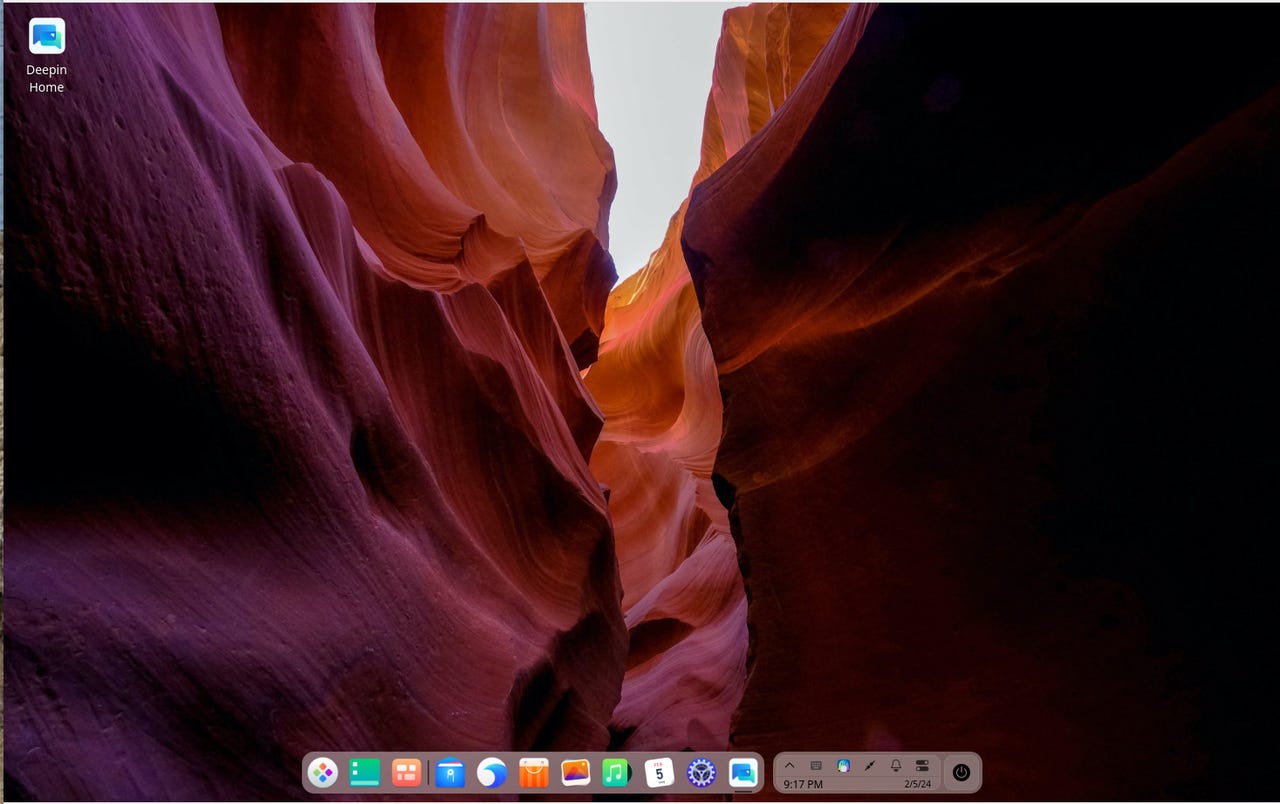
Deepin Desktop is still one of the most beautiful and user-friendly environments on the market.
Jack Wallen/ZDNET
ZDNET’s key takeaways
Deepin Linux 23 beta 3 is available now to download and install for free.It’s beautiful, it’s seamlessly integrated, and it’s easy to use.As has been the case, over the years, there are security concerns when using Deepin Linux (which were pointed out in this piece from FOSS Linux). Because of this, I would highly recommend you simply install the Deepin Desktop on your distribution of choice to avoid problems.
I remember when Deepin first hit the market. It was a game-changer like nothing we’d seen before. It was elegant on a level no other Linux desktop had ever achieved while. At the same time, it was as user-friendly as any GUI environment available.
But then other desktops took notice and either started revamping or even adopting the Deepin Desktop, giving it a few customized tweaks to take it to the next level. The consensus quickly became that Deepin had serious competition. The developers of distributions like Zorin OS and Rhino Linux took this to heart and upped their games.
Also: The best Linux laptops
The results were a flood of gorgeous desktop environments for the Linux operating system.
All the while, the Deepin developers continued rolling along, allowing the desktop environment to evolve and become something even more user-friendly (and equally attractive).
With the beta release of the upcoming version 23 of the desktop OS, Deepin once again proves it can deliver something special. I downloaded the latest beta ISO for the distribution and created a VirtualBox VM. As soon as the installation was completed, I logged in and all I could do was nod and smile.
Also: The best Linux distributions for beginners
Deepin has done it again… reclaimed its spot at (or near) the top of the most beautiful Linux desktop distribution on the market.
It’s smooth, it’s classy, it’s everything you want in a modern desktop.
But looks aren’t everything. Deepin goes a long way to make Linux easy enough that anyone could dive in, without any experience at all, and start using the OS. Part of the reason for that is the Deepin Home app, which is the only launcher on the desktop. Double-click that icon and you are presented with one of the best “Welcome” apps on the Linux ecosystem.
From that app you can access news about Deepin, communicate with other Deepin users, file bug reports, make suggestions, locate helpful resources, join the internal team, and read news from the community. The only thing you don’t get with the Deepin Home app is quick access to oft-used features (like Settings, the App Store, etc.). Fortunately, you’ll find launchers for those things in the doc at the bottom of the screen.
The Deepin Home act helps to get you started with the OS.
Jack Wallen/ZDNET
You can also click on the main menu button (far left side of the doc) to reveal the rather Windows 11-like menu.
Also: Microsoft is bringing the power of sudo to Windows Server
The default apps installed include:
Browser (based on Chromium)Deepin MusicDevice Manager (helps you manage hardware and drivers)Deepin Draw (a simple drawing tool)LibreOfficeDeepin MailDeepin MovieDeepin Voice NotesDeepin Text Editor
Years ago, I would have been totally against using a stack of tools created by the same developer team. But after seeing how beautiful all of the Deepin tools are (and how well integrated they can be with the desktop), it all makes perfect sense, in a very Apple kind of way. By doing this, everything just works on a level that has been relegated to MacOS for some time.
And, yes, I would easily claim Deepin to be the MacOS of Linux and, as someone who uses both, I firmly believe that’s a good thing. Given how busy I’ve become over the years, the importance of having a desktop OS that works in harmony with itself and me cannot be overstated. And the beta of Deepin 23 goes a long way to prove it’s up to that task.
Also: How to access and sync iCloud notes on Linux
Deepin is based on Debian, so it uses the apt package manager. The one miss I’ve found is that it does not include either Snap or Flatpak out of the box. Fortunately, that can be remedied with commands like:
sudo apt-get install snapd -y
sudo apt-get install flatpak -y
What’s new with v23?
As far as what you can expect to be new with the latest release, here’s a short list:
New wallpapersNew repositoriesAdded HWE 5.18 kernelSupport for atomic updates and system rollbackSupport for the new Linglong package format (along with minimal Linglong application).
As to the Linglong packages, I will probably be avoiding them for some time, at least until they are proven to be trusted. Until then, if I should opt to migrate to Deepin, I’d stick with apps from Debian repositories and Snap/Flatpak installs.
My recommendation
After spending this short time with Deepin 23, and taking into consideration any doubt that surrounds Deepin Linux, I’m inclined to always go the “better safe than sorry route” and suggest installing the Deepin DE on your Linux distribution of choice (such as Debian, Ubuntu, or Fedora), instead of opting for the full-blown Deepin distribution. This way you still get the beauty and ease-of-use found with Deepin, without the possible security concerns.
Also: blendOS is the Swiss army knife of Linux distros but it’s not for everyone
You could also always try one of the Linux distributions that ship with Deepin, such as ExTix or UbuntuDDE.
You can download an ISO of Deepin 23 beta 3 from the official download page, but I wouldn’t suggest using this for production environments. Again, this is a beta release, so expect issues to pop up now and then.
>>> Read full article>>>
Copyright for syndicated content belongs to the linked Source : ZDNet – https://www.zdnet.com/article/deepin-23-aims-to-reclaim-the-title-of-the-most-beautiful-linux-desktop/#ftag=RSSbaffb68










